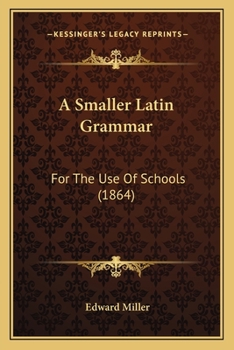A Smaller Latin Grammar: For The Use Of Schools (1864)
A Smaller Latin Grammar: For The Use Of Schools (1864) by Edward Miller is a comprehensive guide to the Latin language designed specifically for students in schools. The book covers all aspects of Latin grammar, including nouns, pronouns, adjectives, verbs, adverbs, prepositions, conjunctions, and interjections. It also provides a detailed explanation of Latin syntax and sentence structure. The book is written in a clear and concise style, making it easy for students to understand and follow. It includes numerous examples and exercises to help students practice and reinforce their knowledge of Latin grammar. Overall, A Smaller Latin Grammar is an essential resource for anyone learning Latin in a school setting.This scarce antiquarian book is a facsimile reprint of the old original and may contain some imperfections such as library marks and notations. Because we believe this work is culturally important, we have made it available as part of our commitment for protecting, preserving, and promoting the world's literature in affordable, high quality, modern editions, that are true to their original work.
Format:Paperback
Language:English
ISBN:1164550403
ISBN13:9781164550402
Release Date:September 2010
Publisher:Kessinger Publishing
Length:194 Pages
Weight:0.59 lbs.
Dimensions:0.4" x 6.0" x 9.0"
You Might Also Enjoy
More by V.R. Bennett
Customer Reviews
0 customer rating | 0 review
There are currently no reviews. Be the first to review this work.




























































